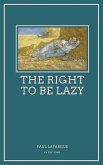"Martin should be commended for finding a niche in this vast literature and managing to say something original ... His book is worth reading because it reminds us of an important aspect of Enlightenment thinking, one that questioned the freedom of the will." · H-France "... strongly recommended for specialists and advanced scholars of the period." · History: Review of New Books "... a valuable contribution to the institutional history of the Jacobin clubs." · Canadian Journal of History What view of man did the French Revolutionaries hold? Anyone who purports to be interested in the "Rights of Man" could be expected to see this question as crucial and yet, surprisingly, it is rarely raised. Through his work as a legal historian, Xavier Martin came to realize that there is no unified view of man and that, alongside the "official" revolutionary discourse, very divergent views can be traced in a variety of sources from the Enlightenment to the Napoleonic Code. Michelet's phrases, "Know men in order to act upon them" sums up the problem that Martin's study constantly seeks to elucidate and illustrate: it reveals the prevailing tendency to see men as passive, giving legislators and medical people alike free rein to manipulate them at will. His analysis impels the reader to revaluate the Enlightenment concept of humanism. By drawing on a variety of sources, the author shows how the anthropology of Enlightenment and revolutionary France often conflicts with concurrent discourses. Xavier Martin is a Historian of Law and Professor at the Faculty of Law, Economics and Social Sciences at Angers University. He has published extensively on the ideology of the French Revolution and on the Code Civil of 1804.








